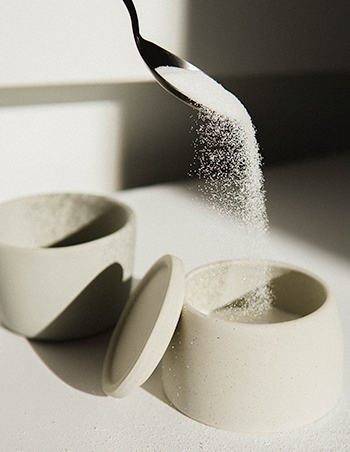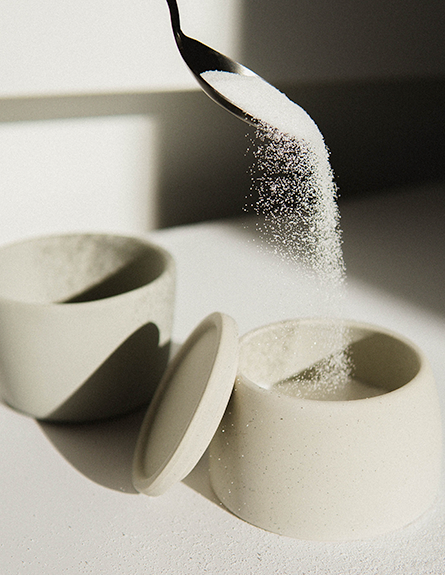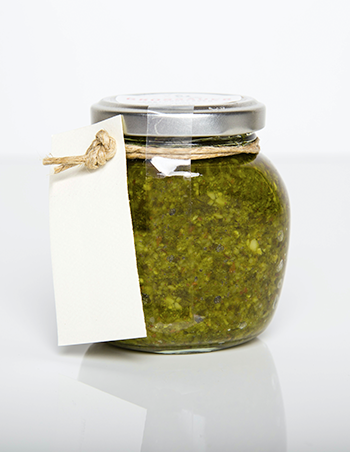
Risk or Reward? Exploring Artificial Sweetener Use in 2022
Date: 10/07/2022
For those of us who have a ton of concerns about our health, the word artificial can often make us shy away from certain products. We like to keep it natural, since natural (more often than not) equals healthy.
Knowing that it’s important to keep it natural for our physical and mental health (as much as we possibly can), I became interested in exploring artificial sweeteners and their effects on our bodies. Are artificial sweeteners dangerous? Are they safe? Are there alternatives we can turn to that don’t include processed ‘natural’ sugar found in the store?
It turns out that there are some key studies that bear warning signs about frequent use of artificial sweeteners—including this recent article which outlines the finding of an artificial sweetener study completed between 2009 and 2021.
From the data, participants who averaged an intake of 42 mgs of artificial sweeteners per day (about a third of a can of diet soda) were more likely to experience heart problems – including heart attack and stroke – than were those who did not report consuming high levels of artificial sweeteners. Even the World Health Organization does not support “the use of sweeteners as a safe alternative to sugar.”
Although many experts are certain that more research is needed in this area, many others say we should not ignore preliminary findings at this stage.
All in all, I think it’s important to understand the current opinions that researchers and the popular health community have about artificial sweeteners—also known as Nonnutritive Sweeteners (NNS).
As more products come to our shelves containing these additives, we should be aware of how these sweeteners can have negative effects on our bodies.
That’s why today, I want to support you in making an informed decision about whether artificial sweeteners should be a part of your diet. This article explores what artificial sweetener is, the negative health effects of artificial sweeteners, and some important alternative sweeteners you can use to avoid the detrimental health effects being correlated with NNS!
What is an artificial sweetener?
Found in a variety of dietary and medicinal products nowadays, artificial sweeteners are sugar-like substances that are more intense in their sweetness rating than regular sugars, and often provide zero caloric intake. Nonnutritive sweeteners (NNS) are also growing in popularity, with about 31% of adults reporting they consumed artificially sweetened beverages between 2009 and 2012.
The intent with artificial sweeteners is to reduce the risks of becoming obese, of developing type-II diabetes, or with any other form of cardiac abnormality associated with increased use of refined, sugar-sweetened products.
At the time of writing, there are about six NNS that have been approved by the FDA, including aspartame, saccharine, sucralose, neotame, acesulfame-K, and stevia, all of which are seen as safe to consume by humans, so long as consumption stays within the daily recommended average.
Are there positive health benefits of artificial sweeteners?
I believe the negative effects of artificial sweeteners far outweigh the potential benefits. And while there are some studies which speak to relative benefits to body weight, fat mass, and dental health, in the context of overall health and considering the recent findings I’ve mentioned above, I don’t see why anyone would risk artificial sweetener consumption when there are plenty of safe alternatives to choose from. Particularly when we look at the list of comparative risks for NNS consumption below!
Four negative health effects of artificial sweeteners
Before I dig into some of the negative effects that result from increased use of artificial sweeteners, I do want to mention one thing: although there was a study completed in the late 1970s which linked artificial sweeteners to liver and other cancers, that link has since been debunked. At this point in time, there is no causal link between NNS use and cancer of any kind—though more studies continue to challenge this daily.
Here is another source which confirms this fact.
That known, there are still some worrying effects associated with artificial sweeteners that you may find interesting. For example, this study speaks to the addictive effects of artificial sweeteners, whereby tested animals chose saccharin over literal cocaine when given a choice between the two.
From my preliminary search into the topic then, here are four more negative effects researchers have named when it comes to use of artificial sweeteners in a regular diet. Interestingly, many of these negatives are directly opposed to the benefits promised by NNS in the previous section…which means we should ultimately take the benefits of artificial sweetener use with a grain of…sugar!
1. Negative effects on blood glucose, insulin levels, and glucose intolerance—plus increased risk of diabetes
So many of the articles I came across spoke to the adverse effects that artificial sweeteners have on diabetes risk—way too many to ignore! And while many of them focused on artificially sweetened beverages, the consensus is that artificial sweeteners increase your risk of developing type II diabetes.
According to this article, what happens is that the ingestion of NNS results in insulin release that is mistaken for glucose due to the sweet taste of these artificial sweeteners. Increased insulin in the blood then decreases the ability of your receptors to receive signals of increased insulin, causing insulin resistance in the body.
Because of the close relationship of insulin and glucose levels in the blood, some studies have also found that artificial sweeteners (wherever they appear) in our food or drinks can alter glucose balances, which in turn can result in glucose intolerance—even in healthy, non-obese human subjects.
2. Increased body weight/ obesity
Although we did mention that artificial sweeteners have been found to reduce waist circumference and stave off weight gain, other studies in this area show the consumption of NNSs can result in body weight increases, even when food intake doesn’t change.
In other words, it doesn’t matter if your diet stays the same—evidence continues to suggest that artificial sweeteners are contributing to the obesity epidemic we see in the US. This is likely because of the association of NNSs with an inability to feel full after consumption, and is counterintuitive to why artificial sweeteners were created in the first place.
“Participants in a San Antonio Heart Study who drank more than 21 diet drinks per week were twice as likely to become overweight or obese as people who didn’t drink diet soda.”
So, what are the sources of this effect if artificial sweeteners don’t add calories to a person’s daily intake?
Well according to a review of studies on this topic from Harvard, high NNS use can lead to an overstimulation of our sugar receptors, thereby making less sweet foods much less appealing—including your average daily serving of fruits and veggies.
More importantly though, artificial sweeteners play tricks on us, have a hand in producing metabolic dysregulation, and prevent us from associating sweetness with calories. As a result, humans will end up craving more sweet things to trigger the caloric response, which can cause weight gain over time.
3. Increased incidence of stroke among obese persons, plus increased metabolic syndrome risk
What’s metabolic syndrome you ask? It’s a placeholder name for an array of medical conditions including high blood sugar, high blood pressure, abnormal cholesterol levels, and excess belly fat, all of which can ultimately increase your risk of chronic diseases like stroke, heart disease, and as I said, type II diabetes.
With some studies therefore suggesting that – for example – diet soda drinkers can have up to a 36% higher risk of metabolic syndrome, and knowing how important our gut bacteria is to a healthy immune system, it’s easy to see where the connection between the use of artificial sweeteners and our health collide.
For example, among obese persons – most particularly women – another study directly correlates the consumption of less than or equal to 24 oz. of artificially sweetened beverages (ASBs) per day with an elevated risk of stroke, ischemic stroke, and coronary heart disease.
Whether this increased risk remains for non-obese persons remains to be seen. However, with four study subjects showing poor blood sugar control after just five days of consuming NNSs, the trend has me worried enough to be concerned about my own NNS intake—particularly since my immune system isn’t always performing its best.
4. Impaired cognitive function
The fourth negative effect I noticed during my research was that there was a common link between the use of artificial sweeteners like acesulfame (FDA-approved) and cognitive impairment.
This article for instance talks about how mice who consumed artificial sweeteners demonstrated a reduction in cognitive ability, while this one links artificially sweetened beverages to negative learning outcomes.
Finally, this article from Nature.com discusses the effects that aspartame for example can have on the brain, including the potential for mental disorders to develop through compromised learning and emotional functioning.
Artificial Sweetener Alternatives
So how do we avoid artificial sweeteners in our foods? Well, with this recent article pointing to increases in artificial sweetener in our groundwater (and thus our drinking water), it is going to become harder and harder to avoid ingesting artificial sweeteners on a daily basis.
But aside from the obvious methods of avoidance, like checking labels, reducing consumption of artificially sweetened beverages or diet beverages, and going without sweetener added to our morning tea, coffee, or water, we can also choose to adopt natural sweeteners into our diet that can give us that sweet taste, without having to question the potential dangers of NNS over-consumption.
What are natural sweeteners?
Natural sweeteners are sugar-like extracts or products that are less refined or processed than artificial sweeteners. These usually show up naturally in grown foods. Incredibly, the FDA also recognizes some natural sweeteners as generally safe for human consumption, including honey, molasses, maple syrup, and most fruit juices and nectars.
In my personal experience, and on the word of good friends who are ultra health conscious, I also recommend natural sweeteners like stevia and agave syrup. These are popular shelf items in any health food store, where staff are likely to help you find which option will be best for you based on your intended use.
Of course, these more natural sweeteners are not without their risks, and those with diabetes or who are obese should be careful about their sugar intake as well as their NSS intake. Nevertheless, these types of sweetener may be able to offset the dangers associated with elevated artificial sweetener consumption, all while answering that darn sugar craving!
What is your personal experience with artificial sweeteners?
Research is one thing, and personal experience another! I know there are tons of personal accounts in forums and health blogs that speak to other negative by-products that come from using artificial sweetener. In these cases, there may not be a scientific basis of proof for these effects, but I think they are important testaments to the potential risks of high NNS consumption.
For example, I’ve heard of people getting headaches or even migraines as soon as they chew artificially sweetened gum, while others get a sick nauseous feeling after drinking any beverage that was sweetened artificially.
That’s why I am curious about your own personal experience with artificial sweeteners, and whether you have noticed any positive or negative affects since you started (or stopped) including them in your diet. Did you lose weight? Did you find you had more cravings for sweet things? I want to know—so feel free to reach out to me through my Instagram to share your experiences anytime.
Until then, I wish you a very healthy journey to greatness!
Thanks for reading,
Love,
![]()
Lena
SUBSCRIBE
Get the latest updates, sneak peeks and more.
 Back To All Posts
Back To All Posts Previous Post
Previous Post

